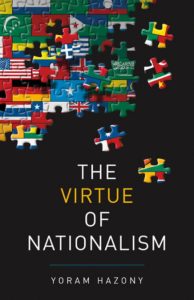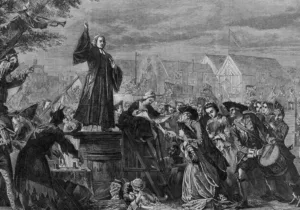This book review of Yoram Hazony’s The Virtue of Nationalism first appeared in the Fall 2018 issue of Providence’s print edition. To receive complete access to the journal as soon as it’s published, be sure to subscribe.
Through the early twentieth century, nationalist sentiment was esteemed because it expressed desires for self-governance and freedom from oppression, and the sentiment squared with the growing awareness of rights, political freedom, and dignity held by people and peoples. “But Hitler changed all that,” argues Israeli political philosopher Yoram Hazony, president of the Hertzl Institute, in The Virtue of Nationalism. The century which began as a contest between opposing universalist claims (liberal and socialist theories) and nationalism, saw the latter collapse because of its association with Nazi atrocities.
Nationalism is back, however. In the United States, Eastern and Central Europe, and elsewhere, appeals to the nation are on the rise, and Hazony provides its thoughtful defense in his The Virtue of Nationalism. Hazony, to his credit, does not defend nationalism as some mere modus vivendi, but instead claims that the “national state” is the best expression of political order and an international system of national states is preferable to anarchic and imperial alternatives. The national state is the political form best suited to preserve domestic peace, the conservative goods of family and local culture, freedom, and creativity.
 Empire, Hazony argues, is the national state’s biggest threat, conceptually and empirically: empires are universalist and seek to impose their impersonal, abstract values on nations; they stultify in the name of “humanity” and shame national pride by trumpeting universal ideals, as for instance the UN routinely shames Israel. The Virtue of Nationalism is also a strikingly personal book, with vignettes of his childhood and his love of Israel imbuing the book with both intimacy and urgency; Hazony’s case for the nation is a case for his home, Israel. And as he makes plain in an earlier, excellent, and likewise provocative book, The Jewish State: The Struggle for Israel’s Soul, his defense is of an Israel of “the Jewish people, the land of Israel, [and] Jewish national values.” The Virtue of Nationalism is remarkably clear and direct, and in more than a few places, beautifully written.
Empire, Hazony argues, is the national state’s biggest threat, conceptually and empirically: empires are universalist and seek to impose their impersonal, abstract values on nations; they stultify in the name of “humanity” and shame national pride by trumpeting universal ideals, as for instance the UN routinely shames Israel. The Virtue of Nationalism is also a strikingly personal book, with vignettes of his childhood and his love of Israel imbuing the book with both intimacy and urgency; Hazony’s case for the nation is a case for his home, Israel. And as he makes plain in an earlier, excellent, and likewise provocative book, The Jewish State: The Struggle for Israel’s Soul, his defense is of an Israel of “the Jewish people, the land of Israel, [and] Jewish national values.” The Virtue of Nationalism is remarkably clear and direct, and in more than a few places, beautifully written.
Unlike some contemporary nationalists who might look to his book as a justification for their “blood and soil” politics, Hazony believes nationalism is redeemable absent the racial implications. He struggles to distinguish nationalism from its racist connotations and embeddedness in biological conceptions of peoplehood. He argues this by reintroducing the Hebrew Bible (Old Testament) into political reflection: the “idea that political order should be based on independent nations was an important feature of ancient Israelite thought as reflected in the Hebrew Bible.” The nation presented in the scriptures, he continues, “has nothing to do with biology, or what we call race” (italics his).
Hazony’s expansion of the Western canon of political theory to Hebrew scriptures is welcome, but for his purposes he anchors both the case for the nation and against its imperial and anarchic alternatives. In the Bible, according to Hazony, “we find the first sustained presentation of a different possibility [than empire]: a political order based on the independence of a nation living within limited borders alongside other independent nations.” The scriptures commend a “single nation that is united, self-governing, and uninterested in bringing its neighbors under its rule.” Its leader is a “king,” “one of the people, and not the representative of some abstract universal ambition.”
The same scriptures reject empire and anarchy. The tower of Babel and the story of Noah’s ark represent and reject these polar opposites: Babel becomes a symbol of the temptation to “unite humanity under one language in a single community of purpose”; Noah’s ark displays a “tiny, familiar community cast out of a violent and anarchic mankind.” All three strands of political alternatives—empire, anarchy, and nation—are woven into Western political thought, Hazony argues, and appear and reappear over time and based on circumstance. The reappearance of “nation” as an alternative is a consequence of its retrieval from Hebrew scriptures by Protestant theologians who recognized the good of the nation and an international system built upon a plurality of nations, each pursuing its own unique purposes and developing its own vision of human life, every one “under its own vine or its own fig tree.”
Hazony’s argument here is novel in reclaiming the role of Jewish and Christian political thinking rooted in scripture. Though his argument only presupposes the claim, we can agree with him about the deficiency of thinking that Western political thought is merely Greek and Roman in origin and subsequent development. Ancient Israel, for better and for worse, remained an archetypal aspiration for much and varied political thought throughout the West, ranging from, for instance, John Calvin and John Foxe to German theologians in the early twentieth century.
Christian political thought, as the heirs to Hebrew scripture, spawns divergent traditions through which these ideas develop over time. Hazony identifies Catholic political thought in particular as a major defender of the imperial temptation. Developing through Greek and Roman resources that become by implication imperialistic, the Catholic political tradition expands the imperialistic aspiration justifying and aligning itself, “not with the ideal of setting the nations free as had been proposed by the Israelite prophets, but with…the aspiration of establishing a universal empire of peace and prosperity.” The corrective for the Catholic imperial move is found by returning to the Hebrew Bible.
Catholicism’s ostensible imperialism is dealt with in two brief paragraphs. Hazony moves to the two ways Hebrew scripture reasserted itself in Western political thought through Protestant reaction against Catholic imperialism. The independent “national state” rested on the Protestant assertion of two political principles having their origin in those scriptures: first, the enforcement by governance of merely “the minimum requirements [set by the God of Israel] for a life of personal freedom and dignity for all,” and second, “the right of self-determination” and freedom from interference by external powers. These two principles are in creative tension, according to Hazony, as the former sets governments under the judgment of God, but protects those governments from abstract claims advanced by other nations against them.
The idea of nationalism as a virtue, then, arises from Aristotelian conception of the virtue as the mean between two vices: since empire and anarchy name the vices or extremes into which politics can lapse, the nation as “the conceptual midpoint between these others” becomes the virtue. In perhaps the analytical heart of the book, Hazony defines his terms: a nation is “a number of tribes with a shared heritage, usually including a common language or religious traditions, and a past history of joining together against common enemies.” (We should note that by this definition, Europe is a nation; think of its history fighting Turks and Saracens.) A “national state,” or the political and governmental expression of a nation, is “midway between the family or clan and the imperial state in terms of scale.” The national state so conceived does have a more biological aspect than does empire, which is conceptually further from “family” or tribe. But it avoids the imperial vice of abstraction, the temptation to stand for “humanity” and the impersonal “universal” into which empire falls. Nationalism takes the good from these alternatives: from empire it takes “allegiance that is directed towards the abstraction of the state rather than to familiar men…and the possibility of an impartial judicial system.” From anarchy it takes the “ideal of a ruler devoted to the unique needs and interests, traditions and aspirations of a particular community that is different from all others.”
Nationalism, however, has few scholarly allies, even among the Israeli intelligentsia. In The Jewish State, Hazony describes Israeli Jewish intellectuals defending Israel as a “‘state of its citizens’—a regime that not only seeks a ‘separation’ between Jewish religion and state, but which also seeks a ‘separation’ between Jewish nationality and state.” Even fewer regard nationalism as a virtue. Hazony thus devotes an entire chapter to repudiating the association of nationalism with hatred, during which he writes with great emotion about the damned-no-matter-what-it-does position of Israel, in many eyes both the sufferer of Auschwitz and its potential perpetrator. The righteous emotion Hazony expresses in this section of the book, coupled with the touching vignettes describing a love for Israel passed on to him by especially his father, give his argument an urgency not typical to political theory, but greatly appreciated nonetheless. Hazony never lets his reader forget the values at stake.
That said, I can’t help but wonder at least two things about Hazony’s argument: one, at what cost does the argument for Israel’s rights of self-determination and governance court nationalism, and two, is courting nationalism the only option for the kind of Israel Hazony wants to protect? Great weight in Hazony’s argument is borne by his classification and definitions of nationalism, imperialism, and anarchy. He does not dwell on alternative forms of political organization and seems uninterested in non-universalist but non-nationalist political institutions that characterized, for instance, both the Holy Roman and Habsburg Empires. While both were composed of different peoples, cultures, languages, and other components of nations, neither “empire” strove to eradicate them. For him, not to be nationalist is to be imperialist simpliciter.
Thus, the usual connection of Nazism (National Socialism) is, according to Hazony, confused: it connects Germany’s evil with the first adjective rather than its second (which names an imperialist form). “Hitler,” Hazony writes, “was no advocate of nationalism.” “Nazi Germany was, in fact, an imperial state in every sense.” But this is not quite right. Yes, it’s true that Nazi Germany aspired toward empire; the goal was, as Hazony writes, the establishment of a reich. But it would be both foolish and politically irresponsible to forget that Germany’s imperial aspirations were driven by a notion of the German nation, or Volk, with origins in German Romanticism and Idealism, tracing through thinkers like Johann Gottlieb Fichte and Johann Gottfried Herder, having suffered fragmentation itself at the hands of Napoleonic France, and needing to be gathered together under one flag to assert its rightful place at the head of all peoples. The very first point of the 1920 National Socialist German Workers’ Party’s “Twenty-Five Point” platform is deeply nationalist and asserts the reunification of all Germans in a “Greater Germany on the basis of the right of self-determination of peoples.” The initial expansionist German forays were justified by the reunification of German minorities strewn across Europe’s map.
The point is not to deny that Nazi Germany had “imperial” goals, if by that we mean goals involving the subordination of other nations to itself, the expansion of German territory, and a system of rule that placed Germans at the top of a hierarchy of peoples. The point instead is to note the limitations of the dichotomy Hazony advances between nationalism and imperialism. As he uses the terms, he excludes the possibility of a more adequate description of Germany’s political order as imperialist nationalism. Germany’s nationalism saw itself as ordained to unify Germans and (according to some German theologians drawing on the same Hebrew scriptures as Hazony) to fulfill a divine mandate first offered to and embodied by the Jews. The German Volk, by this nationalist account, was itself licensed to govern the nations: its expansion was grounded in its nationalism.
My second concern relates more fundamentally to Hazony’s account. His account weighs heavily on his rigorous dichotomy between nation and empire because of his concern about the “universalist” pressures on national states like Israel. But the “universalist” pressures of the contemporary international community—the European Union, the United Nations, and even the United States in its more neoconservative moments—are historically distinctive and in some ways unprecedented. They are best understood by the term “liberalism,” as Hazony notes.
To scan backward from them through history while searching for any non-nationalist and therefore “imperialist” movements is a dubious historical approach inviting anachronism and error, and diminishes our imaginative possibilities. Many of the empires named by Hazony, from Rome, the Catholic medieval conceptions, modern era Spain, and so on were not universalistic and certainly not liberal. For instance, the Austro-Hungarian Empire of the late-nineteenth century was a multinational empire, containing different nations with different degrees of rights and administrative structures functioning within the overall structure of the empire. The Roman Empire didn’t destroy nations; it absorbed them. Many of these empires accommodated plural cultures, religions, languages, and forms of governance. Sure, they were not “national states,” and how could they be, since that form of human organization didn’t appear until much later? But they were not liberal; they did not seek to dissolve local communities or languages and cultures; they valued family, place, and local culture.
But if the animating concern of Hazony’s book is to repel liberalism qua “empire,” could he not have pursued it another way? I think so, and I think this could have been achieved in part by drawing on the richness of scripture with categories less wooden than the nationalist-imperialist dichotomy Hazony employs. I agree with Hazony that the Hebrew Bible is an important source of Western political reflection, even if his appropriation of it in support of his dichotomy is dubious, both in terms of its support for the national state and in terms of its opposition to empire cum universal. Biblical Israel was arguably more a theocracy than a nation-state. The people Israel were constituted by their religious commitment to God and the Torah. How would Hazony deal with the fact that for most of its history even the ancient Israelite “nation” was divided into two kingdoms with different rulers? His biblical “nation-state” at best refers only to the kingdoms of David and Solomon.
Even if granted the national state has its origins in Hebrew scripture, might it not also be argued that so does the imperial universalism against which Hazony argues? I cannot speak with confidence about rabbinic interpretation of Genesis’ account of creation and the Noachian covenant, but for much of Christian theology, together they anchored the claim of a common humanity, not as mere “impersonal abstraction” but as a God-given reality against which always to check parochial (“national”) claims. “It is too light a thing that you should be my servant to raise up the tribes of Jacob. I will make you as a light for the nations, that my salvation may reach to the end of the earth” (Isa. 49:6). Hebraic scripture confirms relationships between God and nation and God and humanity; that becomes normative for (at least) Christian theology as it thinks about the tensions between the real and good values of local communities and the real and good values of our membership in a common, universal family.
Which leads to the question about alternatives to nationalism. If we follow scripture as understood by Hazony, perhaps then we face his “either nation or empire” mentality. From the perspective of Catholic political thought, an appeal could be made to the varying levels of political organization available to polities over time, ranging from the city to the nation-state, to regional federations, even up to and inclusive of international law, governed and organized by something like the principle of subsidiarity. Hazony’s account, however, allows no such appeal. “The European principle of subsidiarity is thus nothing other than a euphemism for empire,” he writes. Despite his legitimate concerns about the inevitable encroachment of federal authorities into political spaces reserved for others, his account remains thoroughly nationalist and anti-federation, because nationalists “should not allow a hairbreadth of our freedom to be given over to foreign bodies under any name whatsoever, or to foreign systems of law that are not determined by our own nation.” I’m not sure that strong a conclusion finds justification either in scripture or in history.
Joseph E. Capizzi is a professor of moral theology and ethics at the Catholic University of America, and is executive director of the Human Ecology Institute. He teaches in the areas of social and political theology with special interests in peace and war, citizenship, political authority, and Augustinian theology. His latest book is Politics, Justice, and War: Christian Governance and the Ethics of Warfare (Oxford University Press, 2015).







 Sponsor a student for Christianity & National Security 2024
Sponsor a student for Christianity & National Security 2024